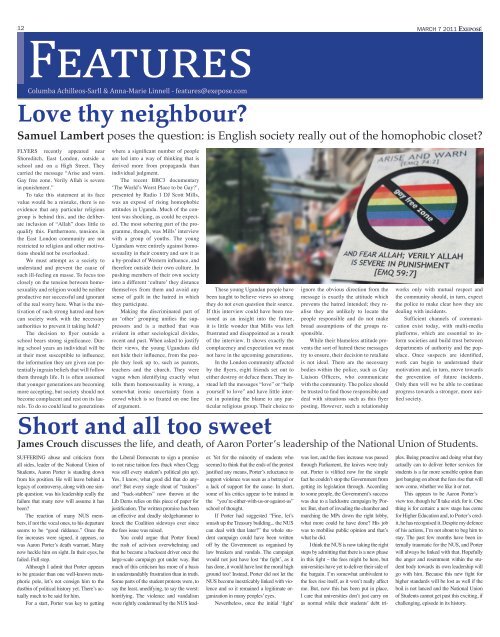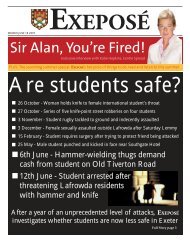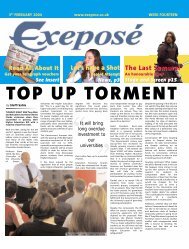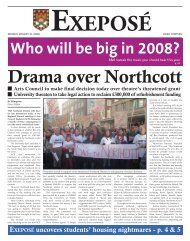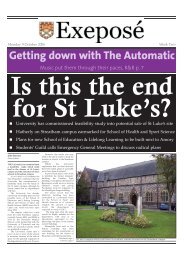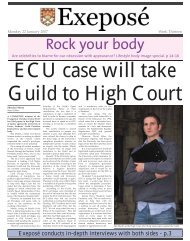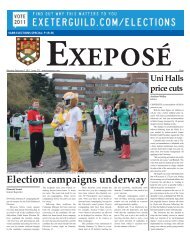Exeter student - Exeposé - University of Exeter
Exeter student - Exeposé - University of Exeter
Exeter student - Exeposé - University of Exeter
You also want an ePaper? Increase the reach of your titles
YUMPU automatically turns print PDFs into web optimized ePapers that Google loves.
12<br />
Features<br />
Columba Achilleos-Sarll & Anna-Marie Linnell - features@exepose.com<br />
march 7 2011 Exeposé<br />
Love thy neighbour<br />
Samuel Lambert poses the question: is English society really out <strong>of</strong> the homophobic closet<br />
FLYERS recently appeared near<br />
Shoreditch, East London, outside a<br />
school and on a High Street. They<br />
carried the message “Arise and warn.<br />
Gay free zone. Verily Allah is severe<br />
in punishment.”<br />
To take this statement at its face<br />
value would be a mistake, there is no<br />
evidence that any particular religious<br />
group is behind this, and the deliberate<br />
inclusion <strong>of</strong> “Allah” does little to<br />
qualify this. Furthermore, tensions in<br />
the East London community are not<br />
restricted to religion and other motivations<br />
should not be overlooked.<br />
We must attempt as a society to<br />
understand and prevent the cause <strong>of</strong><br />
such ill-feeling en masse. To focus too<br />
closely on the tension between homosexuality<br />
and religion would be neither<br />
productive nor successful and ignorant<br />
<strong>of</strong> the real worry here. What is the motivation<br />
<strong>of</strong> such strong hatred and how<br />
can society work with the necessary<br />
authorities to prevent it taking hold<br />
The decision to flyer outside a<br />
school bears strong significance. During<br />
school years an individual will be<br />
at their most susceptible to influence;<br />
the information they are given can potentially<br />
ingrain beliefs that will follow<br />
them through life. It is <strong>of</strong>ten assumed<br />
that younger generations are becoming<br />
more accepting, but society should not<br />
become complacent and rest on its laurels.<br />
To do so could lead to generations<br />
where a significant number <strong>of</strong> people<br />
are led into a way <strong>of</strong> thinking that is<br />
derived more from propaganda than<br />
individual judgment.<br />
The recent BBC3 documentary<br />
‘The World’s Worst Place to be Gay’,<br />
presented by Radio 1 DJ Scott Mills,<br />
was an exposé <strong>of</strong> rising homophobic<br />
attitudes in Uganda. Much <strong>of</strong> the content<br />
was shocking, as could be expected.<br />
The most sobering part <strong>of</strong> the programme,<br />
though, was Mills’ interview<br />
with a group <strong>of</strong> youths. The young<br />
Ugandans were entirely against homosexuality<br />
in their country and saw it as<br />
a by-product <strong>of</strong> Western influence, and<br />
therefore outside their own culture. In<br />
pushing members <strong>of</strong> their own society<br />
into a different ‘culture’ they distance<br />
themselves from them and avoid any<br />
sense <strong>of</strong> guilt in the hatred in which<br />
they participate.<br />
Making the discriminated part <strong>of</strong><br />
an ‘other’ grouping unifies the suppressors<br />
and is a method that was<br />
evident in other sociological divides,<br />
recent and past. When asked to justify<br />
their views, the young Ugandans did<br />
not hide their influence, from the people<br />
they look up to, such as parents,<br />
teachers and the church. They were<br />
vague when identifying exactly what<br />
tells them homosexuality is wrong, a<br />
somewhat ironic uncertainty from a<br />
crowd which is so fixated on one line<br />
<strong>of</strong> argument.<br />
These young Ugandan people have<br />
been taught to believe views so strong<br />
they do not even question their source.<br />
If this interview could have been reasoned<br />
as an insight into the future,<br />
it is little wonder that Mills was left<br />
frustrated and disappointed as a result<br />
<strong>of</strong> the interview. It shows exactly the<br />
complacency and expectation we must<br />
not have in the upcoming generations.<br />
In the London community affected<br />
by the flyers, eight friends set out to<br />
either destroy or deface them. They instead<br />
left the messages “love” or “help<br />
yourself to love” and have little interest<br />
in pointing the blame to any particular<br />
religious group. Their choice to<br />
ignore the obvious direction from the<br />
message is exactly the attitude which<br />
prevents the hatred intended; they realise<br />
they are unlikely to locate the<br />
people responsible and do not make<br />
broad assumptions <strong>of</strong> the groups responsible.<br />
While their blameless attitude prevents<br />
the sort <strong>of</strong> hatred these messages<br />
try to ensure, their decision to retaliate<br />
is not ideal. There are the necessary<br />
bodies within the police, such as Gay<br />
Liaison Officers, who communicate<br />
with the community. The police should<br />
be trusted to find those responsible and<br />
deal with situations such as this flyer<br />
posting. However, such a relationship<br />
works only with mutual respect and<br />
the community should, in turn, expect<br />
the police to make clear how they are<br />
dealing with incidents.<br />
Sufficient channels <strong>of</strong> communication<br />
exist today, with multi-media<br />
platforms, which are essential to inform<br />
societies and build trust between<br />
departments <strong>of</strong> authority and the populace.<br />
Once suspects are identified,<br />
work can begin to understand their<br />
motivation and, in turn, move towards<br />
the prevention <strong>of</strong> future incidents.<br />
Only then will we be able to continue<br />
progress towards a stronger, more unified<br />
society.<br />
Short and all too sweet<br />
James Crouch discusses the life, and death, <strong>of</strong> Aaron Porter’s leadership <strong>of</strong> the National Union <strong>of</strong> Students.<br />
SUFFERING abuse and criticism from<br />
all sides, leader <strong>of</strong> the National Union <strong>of</strong><br />
Students, Aaron Porter is standing down<br />
from his position. He will leave behind a<br />
legacy <strong>of</strong> controversy, along with one simple<br />
question: was his leadership really the<br />
failure that many now will assume it has<br />
been<br />
The reaction <strong>of</strong> many NUS members,<br />
if not the vocal ones, to his departure<br />
seems to be “good riddance.” Once the<br />
fee increases were signed, it appears, so<br />
was Aaron Porter’s death warrant. Many<br />
now heckle him on sight. In their eyes, he<br />
failed. Full stop.<br />
Although I admit that Porter appears<br />
to be greasier than one well-known metaphoric<br />
pole, let’s not consign him to the<br />
dustbin <strong>of</strong> political history yet. There’s actually<br />
much to be said for him.<br />
For a start, Porter was key to getting<br />
the Liberal Democrats to sign a promise<br />
to not raise tuition fees (back when Clegg<br />
was still every <strong>student</strong>’s political pin up).<br />
Yes, I know, what good did that do anyone<br />
But every single shout <strong>of</strong> “traitors”<br />
and “back-stabbers” now thrown at the<br />
Lib Dems relies on this piece <strong>of</strong> paper for<br />
justification. The written promise has been<br />
an effective and deadly sledgehammer to<br />
knock the Coalition sideways ever since<br />
the fees issue was raised.<br />
You could argue that Porter found<br />
the rush <strong>of</strong> activism overwhelming and<br />
that he became a backseat driver once the<br />
large-scale campaign got under way. But<br />
much <strong>of</strong> this criticism has more <strong>of</strong> a basis<br />
in understandably frustration than in truth.<br />
Some parts <strong>of</strong> the <strong>student</strong> protests were, to<br />
say the least, unedifying, to say the worst:<br />
horrifying. The violence and vandalism<br />
were rightly condemned by the NUS leader.<br />
Yet for the minority <strong>of</strong> <strong>student</strong>s who<br />
seemed to think that the ends <strong>of</strong> the protest<br />
justified any means, Porter’s reluctance to<br />
support violence was seen as a betrayal or<br />
a lack <strong>of</strong> support for the cause. In short,<br />
some <strong>of</strong> his critics appear to be trained in<br />
the “you’re-either-with-us-or-against-us”<br />
school <strong>of</strong> thought.<br />
If Porter had suggested “Fine, let’s<br />
smash up the Treasury building... the NUS<br />
can deal with that later” the whole <strong>student</strong><br />
campaign could have been written<br />
<strong>of</strong>f by the Government as organised by<br />
law breakers and vandals. The campaign<br />
would not just have lost ‘the fight’, as it<br />
has done, it would have lost the moral high<br />
ground too! Instead, Porter did not let the<br />
NUS become inextricably linked with violence<br />
and so it remained a legitimate organization<br />
in many peoples’ eyes.<br />
Nevertheless, once the initial ‘fight’<br />
was lost, and the fees increase was passed<br />
through Parliament, the knives were truly<br />
out. Porter is vilified now for the simple<br />
fact he couldn’t stop the Government from<br />
getting its legislation through. According<br />
to some people, the Government’s success<br />
was due to a lacklustre campaign by Porter.<br />
But, short <strong>of</strong> invading the chamber and<br />
marching the MPs down the right lobby,<br />
what more could he have done His job<br />
was to mobilise public opinion and that’s<br />
what he did.<br />
I think the NUS is now taking the right<br />
steps by admitting that there is a new phase<br />
in this fight – the fees might be here, but<br />
universities have yet to deliver their side <strong>of</strong><br />
the bargain. I’m somewhat ambivalent to<br />
the fees rise itself, as it won’t really affect<br />
me. But, now this has been put in place,<br />
I care that universities don’t just carry on<br />
as normal while their <strong>student</strong>s’ debt triples.<br />
Being proactive and doing what they<br />
actually can to deliver better services for<br />
<strong>student</strong>s is a far more sensible option than<br />
just banging on about the fees rise that will<br />
now come, whether we like it or not.<br />
This appears to be Aaron Porter’s<br />
view too, though he’ll take stick for it. One<br />
thing is for certain: a new stage has come<br />
for Higher Education and, to Porter’s credit,<br />
he has recognised it. Despite my defence<br />
<strong>of</strong> his actions, I’m not about to beg him to<br />
stay. The past few months have been internally<br />
traumatic for the NUS, and Porter<br />
will always be linked with that. Hopefully<br />
the anger and resentment within the <strong>student</strong><br />
body towards its own leadership will<br />
go with him. Because this new fight for<br />
higher standards will be lost as well if the<br />
boil is not lanced and the National Union<br />
<strong>of</strong> Students cannot get past this exciting, if<br />
challenging, episode in its history.


